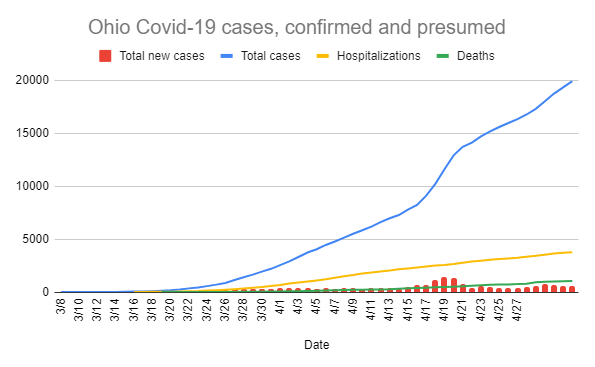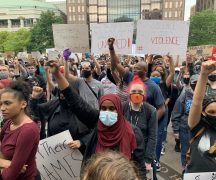By Jake Zuckerman| Tyler Buchanan
For nearly two months now, Gov. Mike DeWine has pulled the levers of government power via executive orders, announced in real time at televised briefings every afternoon.
Ohio’s chief executive and his health director have blocked mass gatherings of people, canceled in-person learning at K-12 schools, and shuttered “non-essential” businesses.
The General Assembly, meanwhile, has taken a backseat role. Lawmakers, set to return to the Capitol this week, have watched DeWine lead a state from a pandemic toward an uncertain economic future as he gradually enacts plans to reopen businesses.
In an interview, Sen. Kristina Roegner, R-Hudson, described lawmakers feeling caught off guard as DeWine effectively delayed a primary election (whose date was set by law by the legislature) less than 24 hours before it was slated to begin.
“That’s sort of how it’s been with all of these executive orders,” she said. “The rank-and-file members were just watching the press conferences and learning about it as it happens.”
Lawmakers have passed one pandemic-response omnibus bill since DeWine declared a state of emergency. The bill rescheduled the election DeWine had already postponed, codified changes the governor ordered to unemployment benefits, waived school testing requirements, and delayed the tax filing deadline, among other things.
However, Ohio has not followed the leads of some other states that have adopted more aggressive legislative responses to a pandemic that has killed more than 63,000 Americans of the nearly 1.1 million infected, per data from Johns Hopkins University accessed Friday afternoon.
New Ohio Covid-19 data:
-19,914 cases (579 new in last 24 hrs)
-3,769 hospitalizations (57 new)
-1,078 ICU admissions (10 new)
-1,038 deaths (17 new)

11Twitter Ads info and privacySee Jake Zuckerman’s other Tweets
An analysis from the National Conference of State Legislatures shows many states have appropriated millions to public health authorities to help combat the new coronavirus. Other legislative acts include expanding family leave policies, shoring up state unemployment systems, establishing legal protections for first responders and essential businesses, creating a COVID-19 legislative committee in Hawaii, and placing a moratorium on evictions.
State Senate President Larry Obhof, R-Medina, has kept a low profile of late. He has not laid out any formal legislative agenda for the new reality of a coronavirus-laden future and has issued few public statements, save for commenting on federal relief packages.
An Obhof spokesman did not respond to interview requests.
Senate Minority Leader Kenny Yuko, D-Richmond Heights, said DeWine has been communicative with Senate Democrats, and he’s glad he didn’t have to make some of the tough decisions DeWine has — decisions that Yuko believes have proven prescient.
With the Senate set to return to the Capitol next week, the minority leader said the caucus does not yet have a set legislative agenda going forward.
“I think what we’re gonna have to do is figure out where the deficiencies are. What is lacking most? Is it the funding? Is it the local government, are they hurting?” he said.
In the state House of Representatives, Republican leadership and rank-and-file members have expressed frustration recently with DeWine’s tempered pace of reopening the economy. However, they haven’t taken any formal action, short of calling members and staff back into the Capitol next week.
On Friday, a House Republican began the process of cobbling together a bill to revoke certain executive powers enabling the closure of business through public health orders.
A House divided
For much of March and April, lawmakers refrained from criticizing the DeWine administration — save for the occasional swipe during an Economic Recovery Task Force meeting.
That changed a week ago, after DeWine announced his plan for a staggered economic reopening. House Speaker Larry Householder, R-Glenford, responded with a stinging statement accusing the governor of not listening to House members’ concerns.
“There is a tremendous amount of frustration from the majority of members in the Ohio House regarding the Administration’s unwillingness to recognize that small businesses that have much less daily traffic in their stores are closed while their large chain competitors have been open throughout the process,” Householder said in a statement.
The angry sentiments among lawmakers against DeWine reached a boiling point on Friday. Rep. Bill Seitz of Green Twp., the third-ranking member of the Republican Caucus, accused Acton of having “tunnel vision” and urged the governor to start listening to elected legislators instead, according to a report by The Cincinnati Enquirer.
Rep. Paul Zeltwanger, R-Mason, is the chairman of the Economic Recovery Task Force but focused his attention during Friday’s meeting on rebuking Acton on Twitter as being “unelected” and having signed a health order “in the dark of night.”
State Rep. Nino Vitale went the furthest on Friday, referring to Acton as a “Globalist Health Director.” The word “globalist” has been used in recent years as an anti-Semitic insult, according to the Anti-Defamation League. James Pasch, an executive director for the ADL’s Cleveland office, said he condemned Vitale’s use of the word.
At his Friday news conference, DeWine reiterated “the buck stops with me” and said complaints about Ohio’s COVID-19 response should be directed at him as governor.
DeWine pushed back against Speaker Householder’s claim that his caucus members’ ideas have been “met with deaf ears.”
“I think they know I’m a good listener,” the governor said Friday, adding that many of the legislators have his cell phone number and address.
“I listen to the concerns that they have about their particular area of the state. I’ve always said that nobody knows a district better than the legislator,” DeWine said. “I have great respect for all the members of the Senate, all the members of the House of both political parties. I welcome their input.”
House Minority Leader Emilia Sykes, D-Akron, said the complaint from Householder that lawmakers are not being heard is misguided. She said the House Democratic caucus has put forward a number of proposals — a stay on evictions, child care solutions, contingency plans for another election during the pandemic.
The Republican majority, she said, hasn’t taken on any initiative and is only griping after the governor acted.
“They’re feeling usurped by the executive branch, but that’s what happens if you don’t do anything and you just sit on your hands,” she said.
Rep. Diane Grendell, R-Chesterland, introduced a bill in April to establish legal protections for essential workers who transmit the coronavirus. Grendell, a former appellate judge, said people can be overly litigious and she wants to make sure business owners aren’t exposed to frivolous lawsuits.
Though confident her own legislation will go the distance, she acknowledged Ohio hasn’t done much legislatively to respond to the pandemic.
“There are some other states doing some things more effectively,” she said.
Omnibus bill
In interviews, some lawmakers cited the omnibus COVID-19 response bill, HB 197, as an example of the Legislature taking the lead.
The bill passed both chambers on March 25. It established the guidelines for a mail-in primary election, prevented municipalities from shutting off residents’ water during a pandemic, moved the tax filing deadline to July 15, waived state testing and report cards for the school year, and other items.
However, the legislation came in response to a unilateral directive from Ohio Department of Health Director Dr. Amy Acton — a DeWine appointee — postponing the election, along with further directives from Ohio Secretary of State Frank LaRose establishing the framework of the election.
Similarly, the legislature’s decision to waive school testing and enact other education changes came after DeWine issued an order closing K-12 schools starting at the closing bell March 16.
Roegner said the General Assembly was in no way strong-armed into drafting and passing HB 197.
“If the governor is going to close down the BMV, we need to make sure people know they’re not breaking any laws by driving on an expired license,” she said.
“We were doing our job to try to help serve the people of the state of Ohio given what the governor was doing in his executive orders.”
What’s next?
In mid-April, a conservative talk show host asked Householder, who declined an interview request for this report, whether there’s any chance a looming coronavirus-related budget hole would warrant a sales or income tax hike in Ohio.
“How the hell do you raise taxes on 800,000 Ohioans?” Householder answered, in reference to then-current unemployment estimates.
(State data released Thursday show more than 1 million Ohioans have filed for unemployment in the last six weeks.)
The sentiment held in interviews with Republican lawmakers in both chambers of the General Assembly.
“I don’t think raising taxes at this time would be a responsible thing to do,” said Sen. Nathan Manning, R-North Ridgeville.
Sykes, a Democrat, said it’s too early to take any firm position on a budget shortfall without knowing how large it will be.
Roegner offered ideas of her own to help kickstart the economy, like ensuring reciprocity across states for occupational licensing and enacting “tort reform” to protect businesses from lawsuits related to the virus.
The first thing to do, she said, is get ahead of a shortfall by reining in spending.
“We’re going to have to address that budgetary shortfall right away,” she said. “We’re going to have to start cutting spending, and it’s gonna hurt.”





